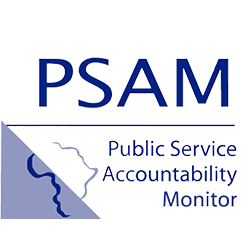
Recent events within the Eastern Cape’s socio-political landscape are stark indicators of the perils of weakened state capacity. On Monday 24 February – a day before the tabling of the State of the Province Address (SOPA), protestors blocked off the N2 outside the provincial administrative capital. Service delivery protests and their frequency potentially offer an important litmus test of communities’ state of satisfaction with municipal performance, so too the trend of civic actors looking to the courts for relief.
In January, the Eastern Cape High Court handed down a landmark judgement directing the dissolution of Makana Local Municipality’s Council under Section 139 (1)(c) of the Constitution, naming Premier Oscar Mabuyane, amongst the long list of state respondents. According to the applicants (the Unemployed People’s Movement), Makana has failed to deliver basic services to its residents, breaching its constitutional mandate.
Makana is of course not the only Eastern Cape municipality to be accused of failing to fulfil the most basic of obligations. Weak municipal capacity has been placed under the spotlight by the Auditor-General whose 2019 municipal audit reports indicate that many municipalities showed regressions in performance and overall financial health. Well-functioning municipalities are core to a capable state, defined as one that has the ability to, inter alia, raise taxes, allocate social grants, deliver health and education services, generate and distribute electricity, and undertake planning. At the local government level; such capacity would mean that a municipality should at least be able to fulfil its obligations as provided for in section 153(a) of the Constitution which provides that:
“A municipality must structure and manage its administration and planning processes to give priority to the basic needs of the community and to promote the social and economic development of the community.”
Municipalities like Makana have failed to live up to this expectation. The consequences of deteriorating municipal capacity are felt most acutely by the most vulnerable residents, deepening inequality and further eroding trust between people and the state. The quality and strength of political and adminstrative leadership lies at the crux of a capable state and central to that are effective accountability mechanisms. Weak and/or compromised leadership poses a direct threat to the promotion of a developmental state that the Constitution requires of municipalities.
The Premier committed little by way of concrete plans to fight corruption in the public service (aside from addressing problems with indigent registers and undertaking lifestyle audits in two years’ time). What of the ghost Anti-Corruption Forum whose multi-stakeholder approach held promise some years ago? Resuscitating this or a similar platform would go a long way to developing provincial responses to a very serious problem.
Levels of poverty and inequality are also significant indicators of a state’s capability. A recent multidimensional diagnostic report of inequality revealed that between 2006 and 2015, inequality decreased in all provinces except in the Eastern Cape and Limpopo. The Eastern Cape has remained amongst the poorest provinces in South Africa over decades, according to Statistics South Africa. The large majority of the poorest people in the province are black people, women and those living in rural areas. And while there have been improvements since 1994 – many are still without access to clean drinking water, adequate housing or access to quality healthcare.
In his SOPA, Premier Mabuyane committed his Executive to reducing provincial unemployment, poverty and inequality through “people-based cooperation between the national, provincial, local spheres of government and State Owned Entities”. It is concerning that the Premier’s address provided no detail on what this people-based approach would entail in practice.
The Premier also stated that the Province would create “478 000 jobs over the MTEF, through the Expanded Works Programme”. The Expanded Public Works Programme (EPWP) is not a viable vehicle through which to create the kind of transformative, sustainable employment that the province needs. The Premier must provide a clear, long-term plan to more effectively address high rates of youth unemployment. The EPWP may be more effective as a stop-gap measure but, as research by Mondli Hlatshwayo in 2017 indicates, while many beneficiaries of the programme appreciate the temporary employment opportunities, they cite workplace safety issues, lack of organised labour and limited prospects of accessing permanent employment and associated benefits as key challenges.
It is encouraging, however, to note the appointment of 333 health practitioners since the last SOPA to ease the burdens across provincial health facilities. Promising too is the province’s commitment to aligning intergovernmental planning and budgeting through the District Development Model, the details for which are anticipated in the provincial Budget Speech in March. Here too – the devil is perennially in the detail.
On to the Premier’s notable silence pertaining to the question of Makana. The Constitution provides that, unless the National Council of Provinces or the Minister (of Cooperative Governance and Traditional Affairs) set it aside, the dissolution of a municipality should take effect within 14 days of notification. The Provincial Executive should place the interests of communities first and provide leadership by complying with the High Court judgement. The Premier and his executive have an important opportunity to respect the demands of the people and deliver against the entitlements enshrined in the Bill of Rights.
The MEC for Finance must now provide the ‘meat’ on the Premier’s skeleton proposal pertaining to addressing poverty and inequality in particular. Each of the Members of the Executive (in their policy speeches) must also outline how they intend to give effect to the developmental needs of the province; one that is capable of delivering quality healthcare and education in addition to protecting the right to a healthy environment and reliable municipal services for all.
Zukiswa Kota is a Programme Head at the Public Service Accountability Monitor (PSAM) based the School of Journalism and Media Studies at Rhodes University. The PSAM is part of an EU- and Heinrich Boll Stiftung-supported project Putting the People in People’s Parliament
